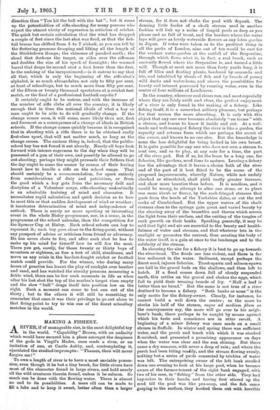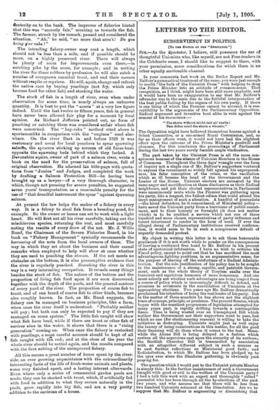To own a length of river is to have a
most enviable posses- sion, even though it be but a tiny brook, for little rivers have most of the character found in large rivers, and hold nearly all the wild creatures therein found, unless it be salmon. So much can be done with the flowing water. There is almost no end to its possibilities. A mere rill can be made to fill a lake and to keep it sweet, better often than a larger
stream, for it does not choke the pool with deposit. The dancing little feeder of a chalk stream used in another fashion will link up a series of limpid pools as deep as you please and as full of trout, and the borders where the water laps will grow as lovely waterside flowers as any lotus garden in Japan. If votes were taken as to the prettiest thing in all the parks of London, nine out of ten would be cast for the verdant water-garden at the outfall of the Serpentine, through which flows what is, in fact, a real brook, such as anciently flowed where the Serpentine is, and turned a little mill. Though at most not more than forty yards long, it is full of lilies and floating plants, bordered by osmunda and iris, and inhabited by shoals of fish and by broods of young wild ducks and water-hens, and shows the possibilities for beauty and interest possessed by running water, even in the centre of four millions of Londoners.
In the country, wherever real rivers run, and most especially where they are fairly swift and clear, the perfect enjoyment of a river is only found in the making of a fishery. Like fishing itself, it is a somewhat solitary pleasure, but perhaps for that reason the more absorbing. It is only with this object that any one ever becomes absolutely "on terms" with a stream, and learns to know it inside and out. At a well. made and well-managed fishery the river is like a garden, the capacity and returns from which are perhaps the secret of the owner, and known to no one else. But the knowledge is none the less delightful for being locked in his own breast. It is quite possible for any one who does not own a stream to rent one, and so to play, at any rate for a time, the part of the river god. But if so, let the lease be a long one, for fisheries, like gardens, need time to mature. Leasing a fishery has the advantage that it leaves a choice both of the river and of the part of it best fitted to be the scene of the proposed improvements, whereby Nature, while not unduly checked or stimulated, shall yield vastly greater increase, and show more beauties than before. It is needless, and it would be wrong, to attempt to alter one stone, or to plant one more shrub or flower, by the .rock-fringed streams that gush from the heads of the Yorkshire dales, or cut the red rocks of Cumberland. But the upper waters of the chalk streams close to the springs gain great and varied beauty by the clearing away of the brambles and thorns which screen the light from their surface, and the cutting of the tangles of rank growth on their banks. Speaking generally, it may be said that light and air are essential to the beauty and health- fulness of water and streams, and that whatever lets in the sunlight or promotes the current, thus aerating the body of the water itself, is a gain at once to the landscape and to the salubrity of the stream.
In choosing the site for a fishery it is best to go up towards the river-head. The floods are less violent, and there is far less sediment in the water. Sediment, except perhaps the finest sand, injures fisheries. Trout-spawn and salmon-spawn are laid in the gravel beds on the shallows, and then left to hatch. If a flood comes down full of cloudy suspended earth, this settles on the gravel and chokes the eggs, which fail to yield their teeming broods of fry. "Half a loaf is better than no bread." But the same is not true of a river destined to become a fishery. "Both banks or none" is the only motto for the fishery-owner. Clearly, for instance, he cannot build a wall down the centre ; so the more he stocks his half of the stream, usque ad medium fdum as the conveyancers say, the more will go over to his neigh- bour's bank, there perhaps to be caught by means against which his taste and conscience are in utter revolt. A beginning of a minor fishery was once made on a small stream in Suffolk. In winter and spring there was sufficient water, and the perch and tench with which it was stocked flourished, and presented a promising appearance on days when the water was clear and the aim shining. But there came a dry summer, with never a drop of rain; and where the perch had been biting readily, and the stream flowing evenly, nothing but a series of pools connected by trickles of water was left. The enterprising owner of the left bank strolled down one evening to look at his Large pool, when he became aware of the farmer-tenant of the right bank engaged, with two of his men, in "fishing" from the other side. They had hay-rakes in their hands, and having first stirred up the mud till the pool was like pea-soup, and the fish came gasping to the surface, they hooked them out with horrible dexterity on to the bank. The improver of fisheries hinted that this was "scarcely fair," meaning as towards the fish. The farmer, struck by the remark, paused and considered the situation. " Ah," he said, "no more that aren't! Do you bring q'ar rake !"
The intending fishery-owner may rent a length, which should not be less than a mile, and if possible should be more, on a highly preserved river. There will always be plenty of room for improvements even there,—in catching pike by the score, for example; and in netting the river for these robbers by profession he will also catch a number of overgrown cannibal trout, and end their careers without respite or reprieve. He will, again, change and refresh the native race by buying yearlings (not fry, which only become food for other fish) and stocking the water.
The stock of fish in a length of river, even when under observation for some time, is nearly always an unknown quantity. It is best to put the " assets " at a very low figure indeed. Until the last twelve or fifteen years, fish in general have never been allowed fair play for a moment by local opinion. As Richard Jefferies pointed out, no form of poaching or catching them was considered unfair where fish were concerned. The "hay-rake" method cited above is sportsmanlike in comparison with the "engines" used else- where. On the river Dart in and before 1828 it was customary and usual for local poachers to spear spawning sahnen, the spearers sticking up screens of old furze-bush opposite the spawning beds behind which they lurked. A Devonshire squire, owner of part of a salmon river, wrote a book on the need for the preservation of salmon, full of original observation. He adorned his title-page with quota- tions from " Junius " and Judges, and completed the work by drafting a Salmon Protection Bill—he having been brought up as a lawyer—of a very thorough character, in which, though not pressing for severe penalties, he suggested seven years' transportation as a reasonable penalty for the use of "that dreadful instrument the spear" against s'pawning
salmon. •
At present the law helps the maker of a fishery in every way. It is a felony to steal fish from a breeding pond, for example. So the owner or lessee can set to work with a light heart. He will first net all his river carefully, taking out the mischievous species, returning the rest, and most carefully noting the results of every draw of the net. Mr. J. Willis Band, the Chairman of the Severn Fisheries Board, in his book on "Fishery Management" cynically recommends the borrowing of the nets from the local owners of them. The way in which they set about the business and their casual remarks when employed to help will show at once whether they are used to poaching the stream. If the net meets no obstacles on the bottom, it is also presumptive evidence that the river is regularly poached. Searching the river in this way is a very interesting occupation. It reveals many things besides the stock of fish. The nature of the bottom and the proportion of living fish food upon it are soon discovered, together with the depth of the pools, and the general contour of every yard of the river. The proportion of coarse fish to trout, and of one breed of coarse fish to other kinds, becomes also roughly known. In fact, as Mr. Band suggests, the fishery can be managed on business principles, like a farm, when once the river itself is understood. "Probably neither will pay ; but both can only be expected to pay if they are managed on some system." The little fish caught will show what fish have bred, while if there are trout or other fish of various sizes in the water, it shows that there is a "rising generation" coming on. When once the fishery is restocked with yearlings, a moat careful account should be kept of all fish caught with tle rod ; and at the close of the year the whole river should be netted again, and the results compared with the first netting of the unimproved fishery.
All this means a great number of hours spent by the river- side, an ever growing acquaintance with the extraordinarily interesting facts of the life of fresh-water animals and plants, some very finished sport, and a lasting interest afterwards. Even wh.ere only a series of ornamental garden pools are made, they can be stocked with trout, which, if artificially fed with food in addition to what they secure naturally in the pools, grow rapidly into big fish, and are a very pretty addition to the environs. of a house.











































 Previous page
Previous page